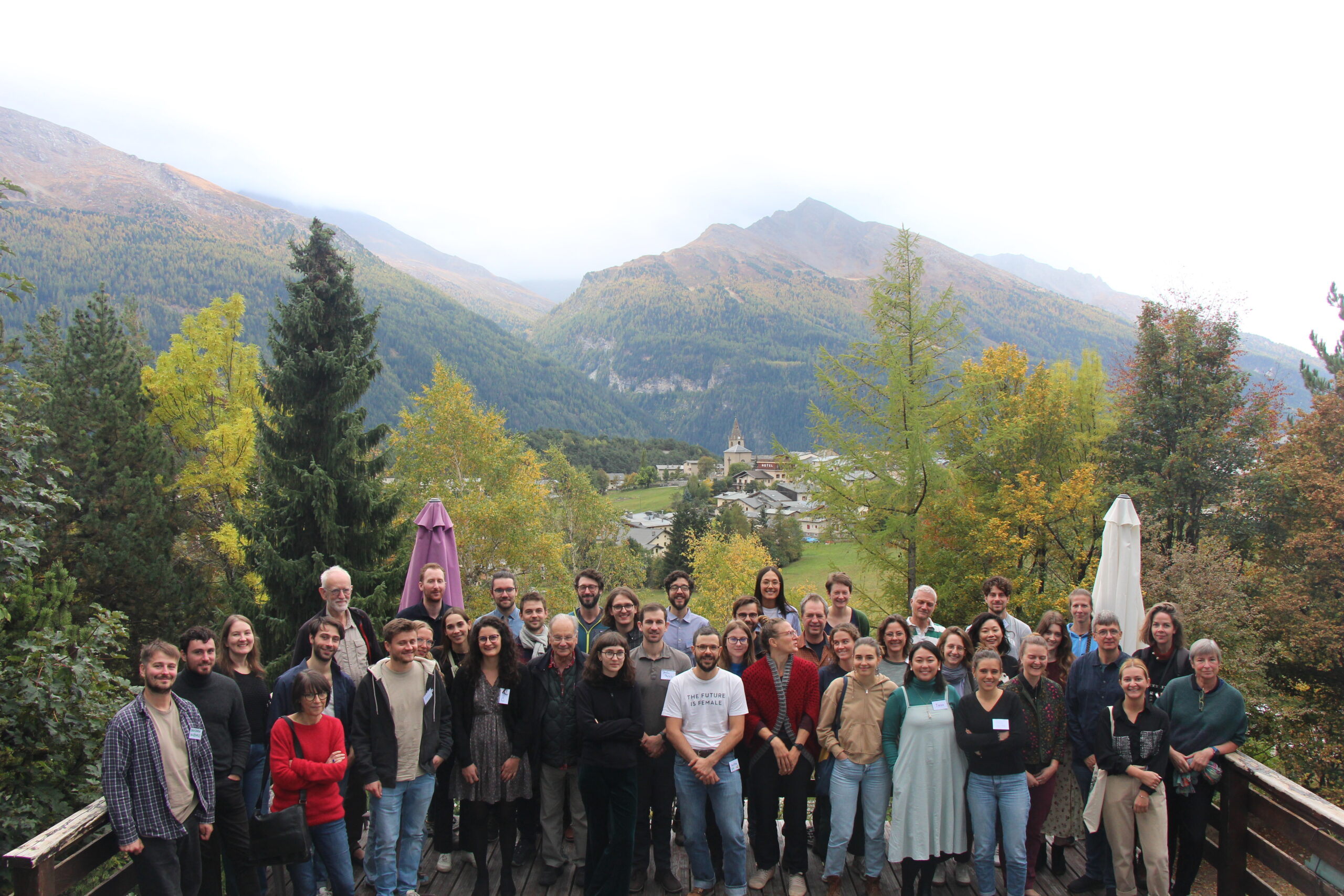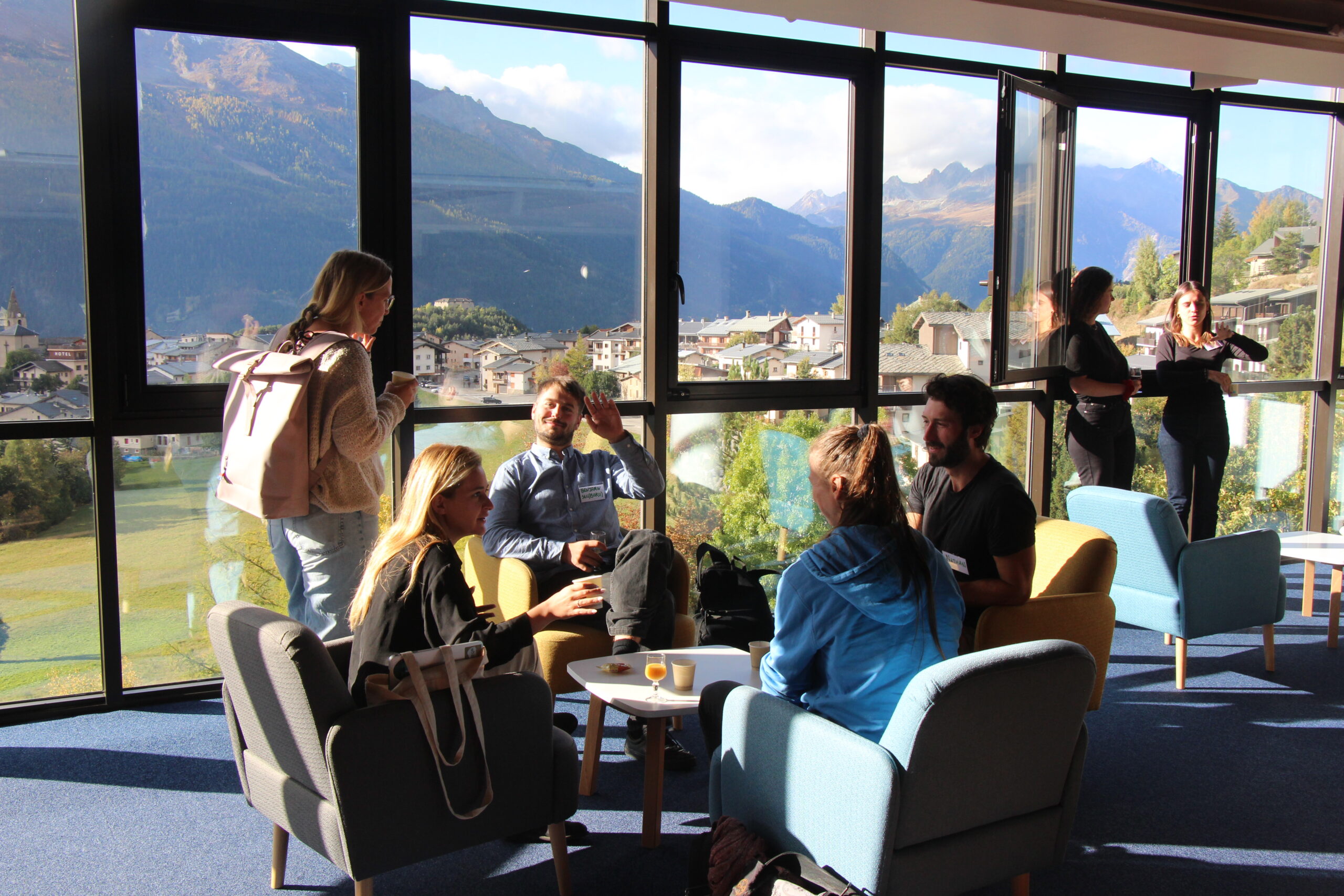Reflecting on Transformations: Insights from the 2023 Future Earth Pathways Autumn School

“Every presentation and every workshop somehow mingled like a puzzle piece with others; like a nice flower […]. They’re wonderful separately, but then they are bunched together, and it’s something even better.”
These words from participant Paulina Budryté, lecturer and researcher at the Kaunas University of Technology, Lithuania, capture the essence of the 2023 Pathways Autumn School, which was held in October in the picturesque mountains of Aussois, France.
The Autumn School convened 30 early career researchers from all over Europe and across the natural and social sciences to discuss current practices of transdisciplinary sustainability science and to reflect on how researchers can better contribute to societal transformations. Throughout the week, guest speakers spoke on topics ranging from the concepts of habitability and social metabolism, environmental justice and conflicts, to the role of environmental humanities and the current processes within the IPCC. The keynote lectures were paired with workshops, allowing participants to further engage with these key topics in the context of practical exercises. Beyond fostering critical reflections, a key focus of the Autumn School was to build a sense of community for the participants.
After the Autumn School wrapped up, we reconvened with some of the participants to discuss their experiences and takeaways, both on a personal and professional level.
Learning and re-learning transformative research
When asked about their initial motivations to apply to the Autumn School, Timothée Fouqueray, post-doctoral fellow at the Institut de l’Ouest, Droit et Environnement in Rennes, France, said he was first looking forward to meeting with other early career researchers to share know-how, good and bad research experiences and to learn new skills.
Gonzalo Cortés Capano, postdoctoral researcher at the Department of Social Sciences and Philosophy at the University of Jyväskylä, Finland, was motivated to connect with other researchers from different career stages, experiences and disciplines. Gonzalo also said “it was an important opportunity to challenge my own thinking, I think that it’s always a good thing and it’s a precondition for learning.”
Tieza Santos, PhD student at Technische Universität Dresden, Germany, wanted to discover different understandings on what transformations really mean for other disciplines outside of the management, technological transformation approach.
Paulina described how, “this concept of the Autumn School, and all the possibilities behind that really motivated me to apply. And it really manifested even in a better way than I was imagining at that time.”

Fostering a shared sense of community
A common thread among the participants, and one around which much of the discussion centered, is that the reflection and exchanges during the school helped to create a shared sense of community. Despite the differences in experiences and disciplines, participants felt that they were able to create connections that will hopefully remain for future potential collaborations.: In Paulina’s words, the School was really about, “feeling not so alone in this big academic jungle.”
As Gonzalo put it, there was, “another way of conceiving community, not in terms of unity, but the ‘communis’, sharing the care and the gift of attention. And that’s why I think that it was really remarkable because I didn’t think that we were redundant in any way, or the same, or even having the same ideas or anything like that. But it was so good to be in such a space to connect and respect and construct from difference.”
For Tieza, another important aspect tied to the sense of community was, “trying to understand what common language, what common value system we share in the type of research that we do. And it’s not just about being able to produce a scientific paper, a journal or a cutting edge framework, but being able to ensure that the work that we do has an impact on the real world.”
Lessons for the future
Whether fostering a sense of community, helping to find meaning in what we do, or to provide practical inspiration for our work, participants all had different takeaways from the School. For Timothée: “It was a real boost, an energy boost for best practices in inter and transdisciplinary research and above all, people, contacts. And I don’t know whether we’ll work together or if we’ll speak in a few weeks, months or years, but I know that we can speak.”
“To be brave and to proceed with what I like to do actually and in what I feel like and sense that there is meaning,” said Paulina, who felt that meeting and exchanging with speakers like Eric Pineault and Anke Schaffartzik inspired her to keep dedicating her science to engaging with communities. In a practical sense, it also helped Gonzalo to, “bring home many ideas on how to do things in terms of working with people and facilitating meaningful discussions.”
Reflecting on concepts, strategies and approaches during the keynotes and workshops helped to expose participants to new perspectives and to challenge existing ones. And it’s while navigating this complexity that Tieza noted: “It helped me to accept this level of vulnerability that you can’t always cover the gaps and the blind spots in the work that you do. Your work will always be vulnerable and that’s fine.” But the safe space that the community provides, a space where you can raise your doubts, “where you know you can be just brutally honest about the shortcomings of your findings” as Tieza put it, is the element that helps us overcome difficulties and that finally is our strength.
For Timothée the School was the realization that he was not alone in this, contrary to what, at times, lonely academic life might make you think. He also added: “I wasn’t expecting to come back to the fact that science, good science, is so necessary for transformation…It’s necessary but not enough. And that’s the ‘not enough’ part I really appreciated, because we have to make this connection between people and science.”
The Pathways Initiative would like to thank all the participants, speakers, and members of the organizing committee who contributed to make this Autumn School a meaningful experience.
If you’d like to stay informed about the Pathways Initiative activities and receive information about the next Autumn School, you can subscribe to the Pathways Newsletter.
DATE
November 21, 2023AUTHOR
Viola BaldeschiSHARE WITH YOUR NETWORK
RELATED POSTS
Apply for the 2024 Pathways Autumn School: Transformative Research for a Just World and a Habitable Planet
Vacancy: Science Officer (France Hub)
Rethinking our Practices at the 2nd Sustainability Science Conference in Marseille, France